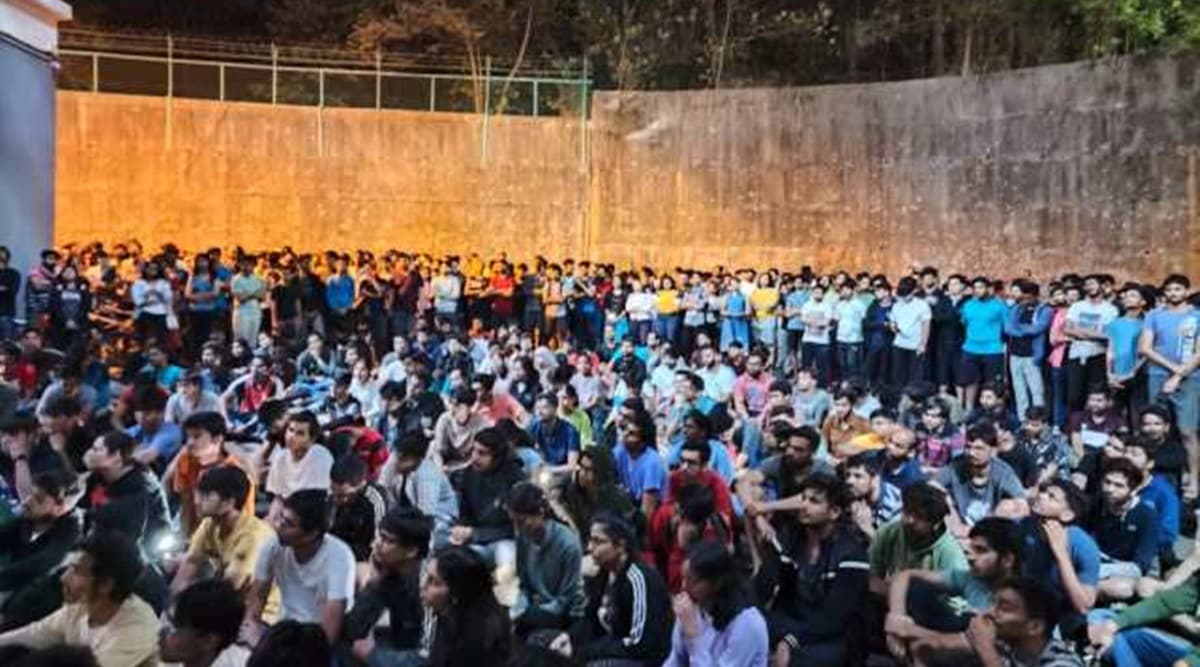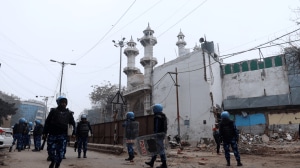At some of India’s premier engineering colleges, the Indian Institutes of Technology (IITs), it’s a question that unfailingly follows that first handshake with a hostel mate, in the anxious moments before the first classroom session, moments into that first cup of coffee at a shared canteen table. For many students from some of the reserved categories, that seemingly innocuous ice-breaker ends up being a proxy for ‘what’s your caste?’.
“Ek bar admission ho gayi, toh life will be sorted. That’s what we keep hearing while preparing for JEE,” says a second-year student of electrical engineering who took admission to IIT Bombay through the reserved category. “So once we arrive here, we take up all these extra-curricular activities, doing all the things — and more — that we missed out on while preparing for JEE. It takes a while to strike a balance and steer yourself back towards academics.” He adds that while most first-year students struggle with their scores, it’s especially tough for reserved-category students, many from marginalised backgrounds who struggle with a combination of factors — from lack of proficiency in English to lack of resources.
A final-year student who was admitted on a reserved category seat says, “I come from a rural area and studied in a Hindi-medium school. In fact, I appeared for the JEE exam in Hindi. But here the medium of instruction is entirely English. Though we are given additional training in English, it sometimes seems impossible to catch up. For instance, while learning about ‘Potential Energy’, I was lost till the point I realised that it was ‘Sthitij Urja’ that the professor was referring to. I skipped the viva of one subject completely because I knew I would not be able to answer in English. The professor would have insisted on me speaking in English… I didn’t want to be humiliated in front of my batchmates.”
Story continues below this ad
His batchmate says this early setback drags the best of them down and that it takes a big push to grow out of it. “All through school, I topped my class. But after coming to IIT, I was among those at the bottom. It added to my stress levels, especially because my family thought very highly of me and I didn’t want to let them down,” he says, adding that he then made a conscious effort to make friends with “general category students”.
Most students agree that the first year on campus is often the toughest to navigate. Says a third-year student, “Now I am in a better position to argue why reservation is needed, if anybody questions it – and there are many who take that position. But when you are new on campus, it’s tough to articulate your thoughts and you are mostly on the defensive. Besides, you anyway have to deal with a lot on the academic front. For a first-year reserved category student who would have been among the toppers in school and college, a Fail and Repeat (FR) grade in IIT can be devastating.”
According to IIT’s internal committee report, Darshan’s FR grade and poor academic performance had a severe impact on him. A first-year student of environmental engineering says, “Darshan was from CE (Chemical Engineering). CE students share their hostels with CSE (Computer Science Engineering) and other sought-after branches. To be in the midst of all these students who are usually among the Top 500 JEE rank holders, especially when you are conscious of your poor scores or if you have an FR like Darshan did, can definitely be stressful.”
After many students questioned the practice of allotting rooms on the basis of rank, IIT Bombay had a few years ago randomised hostel allotment. “Now, rooms are allotted in such a way that there is one student from the general category and another from the reserved category,” said a student.
Story continues below this ad
A second-year student of Electrical Engineering (EE), a reserved category student from Rajasthan, says, “We have complete diversity in our wing when it comes to our hostel-mates. While hostel rooms will have one each from different categories, the wing will have three rooms allotted to one branch and three to a different branch. It ensures that we make friends with people from different backgrounds and branches.”
He, however, admits that the JEE rank is often a giveaway of whether the student is from the general or reserved categories. “Fortunately, I have had a good set of friends around me. But yes, there could be a possibility that some might feel a bit out-of-place. Especially when that is combined with poor scores. If your friends are clearing all courses with ease and you are struggling; it does impact you.”
His roommate and EE batchmate says asking for the rank is just polite conversation. “It is just our go-to topic. Many do not even remember the JEE ranks, especially once the academics start.”
Mitesh Solanki, who is pursuing his Master’s in Society and Culture at IIT Gandhinagar, says the heightened focus on rank and merit keeps out children from marginalised backgrounds who, without proper guidance and mentorship, struggle to catch up – inside the classroom and outside.
Story continues below this ad
“For instance, PORs (Positions Of Responsibilities or leadership roles for various extracurricular activities and clubs) are open only for those with a certain CPI (Credit Point Index). This automatically keeps out many from marginalised backgrounds. This is not because they lack talent. After all, they have cracked the JEE and entered IIT. But once here, a combination of factors works to pull them down — from lack of proficiency in English to lack of confidence to lack of resources, among others,” says Mitesh.
Students also talk about uncomfortable interactions with their professors.
“Often, when we seek additional academic support, it is very common for professors to point out how those admitted on reservation require remedial teaching. Or how reservation has led to a drop in quality of students coming to IITs. Or how India is struggling due to reservation. It is painful to sit through that… Of course, not all teachers do that, but even one such comment is damaging,” says a student.
An excerpt from a research paper published in 2012 by D Parthasarathy, a professor from the Humanities department of IIT Bombay, titled ‘After Reservations — Caste, Institutional Isomorphism, and Affirmative Action in the IITs’, reads, “A particularly perverse form of self-fulfilling prophecy pervades the IITs, as these institutions, forced to implement reservations, but unable or unwilling to be self-reflexive, to question, and to reform their pedagogic techniques, assessment systems, and administrative mechanisms, which supposedly guarantee ‘merit’ and ‘excellence’, end up proving the position of anti-reservationists—that reserved category students lack merit.”
The IITs on their part have over the years launched a string of measures to make campuses more inclusive – from ensuring that the JEE rank of students is not included in any official document or communication to creating sensitisation during orientation sessions, communicating to students on reserved seats on platforms available for grievance redressal, and having government-mandated SC/ST advisors.
Story continues below this ad
In a statement issued by IIT Bombay, the administration stated last month, “The institute takes utmost precautions to make the campus as inclusive as possible, IIT Bombay has zero tolerance for any discrimination by faculty. Caste identity is never disclosed to anyone once the admissions are done… We give strong warnings against discrimination right from the time students enter IIT. While no step can be 100% effective, discrimination by students, it at all it occurs, is an exception.”
The institute administration also pointed to the existence of the SC/ST Student Cell on campus where students can reach out in case of any trouble, including discrimination. While the administration has maintained that the cell has received very few complaints, “whether against faculty or other students”, speaking to The Indian Express, a senior official said that the institute plans to “take more steps through the SC/ST cell by examining what more can be done”.
The SC/ST Cell at IIT Bombay was formed following the recommendation of the A K Suresh Committee which was set up in the wake of the 2014 death by suicide of Aniket Ambhore, a fourth-year B. Tech Dalit student.
Students, however, say most of the measures fall short on the ground.
A member of the IIT Bombay’s Ambedkar Periyar Phule Study Circle (APPSC), a PhD candidate, said, “The SC/ST Cell finally came into existence in 2017 but remained without a designated office until 2022. It continues to await approval for its mandate without which it lacks the required authority to intervene in issues related to SC/ST students.”
Story continues below this ad
The student pointed out how the Cell has stayed silent on Darshan’s death.
In June last year, the Cell held a much-publicised open house, with the institute highlighting how it was the first such discussion on fraught topics such as reservation and caste. During the event, students spoke freely about how there is no uniformity in the way people experience caste – from simple taunts about how students who come in through reservation are “killers of merit” to casual remarks about how they get to study for free.
Last year, the SC/ST Cell at IIT Bombay held two surveys — one in February and another in June. The first survey was aimed at collating data to understand the life of SC/ST students on campus and the problems they face while the second survey focused on the mental health of reserved category students. The Indian Express had reported the findings of the June survey that said caste discrimination is a “central reason” for the mental health problems faced by reserved category students on campus. The survey also found that almost one-fourth of the SC/ST students who took part in the survey suffered from mental health problems while 7.5 per cent of them faced “acute mental health problems and exhibited a tendency for self-harm”.
A member of IIT Bombay’s APPSC alleged that “even the SC/ST Cell is run by faculty members who are not from the community There are no counsellors from the SC/ST community in the institute’s mental health service”.
The Indian Express reached out to the Cell through the PRO of the institute with questions on the survey and some of these allegations but got no response.
Story continues below this ad
Calling for a “big shift”, a student member from the Ambedkarite Students Collective at IIT Bombay said, “There is a need for structural rejigging – just as ragging was banned or eve-teasing is declared a criminal act. Similarly, asking for rank should be banned on IIT campuses. Remedial academic programmes should have professors who are sensitive toward those coming from marginalised backgrounds and do not openly promote meritocracy,” said a student member of the Ambedkar Periyar Study Circle at IIT Bombay.
While IIT Bombay has a regular student mentorship programme aimed at helping freshers navigate the campus, SC/ST students say most of the mentors are from privileged backgrounds and are unable to understand the issues faced by those coming from marginalised backgrounds. “Often, interactions between the mentor and the mentee begin on a wrong note, say, a joke on reservation. Students doubling up as mentors get additional points for the extra-curricular activity, so I am not sure how committed they are to the cause of promoting inclusivity,” shared a student from IIT Bombay.
Last year, the institute had announced that a course on caste-sensitisation would be mandatory for all – students, faculty and staff – but the course is still under preparation.
Highlighting the urgent need for such a conversation, a second-year reserved category student says, “Suddenly the entire focus is on enabling and empowering those coming from marginalised backgrounds. But why not take measures to create awareness among general category students on why reservation is important. There have to be awareness sessions for them. The activities by the SC/ST Cell should go beyond connecting with those coming from marginalised backgrounds. Only a collective effort will ensure an inclusive campus.”
Story continues below this ad
Students say the only way forward is if the faculty, staff and administration at IITs represent a more inclusive structure.
According to data revealed by the Department of Higher Education in the recent winter session of Lok Sabha, despite the Centre’s year-long ‘mission mode recruitment drive’ — held between September 5, 2021, and September 5, 2022, to hire faculty for reserved category positions — only a little over 30 per cent of vacancies were filled.
Of the IITs which submitted data to the government on vacant faculty positions in reserved categories, IIT Roorkee had the highest backlog with 62 posts, followed by IIT Bombay (53) and later by IIT Gandhinagar 34. IIT Madras, which had a backlog vacancy of 44 posts, completed recruitment on 29 posts while 26 posts remain unfilled.
A professor from IIT Roorkee, said, “Campuses of IIT are bound to reflect Indian society and it is futile for the administration to deny the existence of caste on campuses. The focus should rather be on making sure that the affirmative action of reservation is implemented effectively. Reservation is implemented across IITs when it comes to student admissions. But it is missing when it comes to faculty appointments, even after the Mission Mode recruitment drive.”









